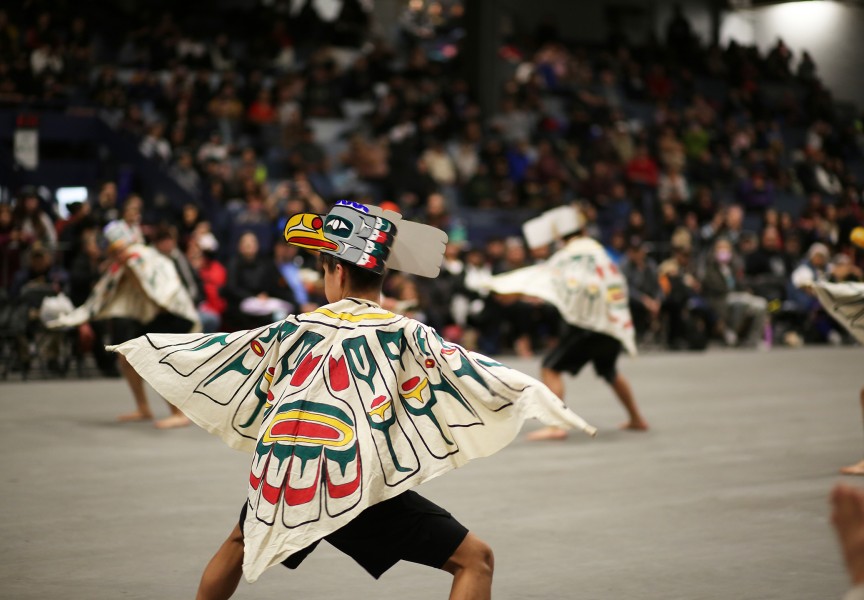An historic three straight days of protests against oil sands, pipelines and tankers took place across B.C. from Oct. 22 to 24, led by a coalition of First Nations, environmental and labour groups.
The events kicked off with a massive protest which drew at least 4,000 to the Legislature lawns in Victoria, led by hundreds of First Nations leaders and drummers decrying the proposed Enbridge Northern Gateway pipeline and the planned expansion of Kinder Morgan's TransMountain pipeline.
The next day, Vancouver activists with Rising Tide, a newly-formed environmental justice group, occupied a Shell Canada gas station, unfurling a banner from its roof reading, “Stop Shell's Tar Sand Expansion.” They stated their action was in support of Alberta's Athabasca Chipewyan First Nation's new constitutional challenge against the government and Shell over expanding its Jackpine Oil Sands mine, which held its first hearing that day.
On Oct. 24, at least 65 communities in every region of the province, including the Lower Mainland, Interior, Kootenays, Vancouver Island and northern regions, held demonstrations outside politicians' offices throughout the day, most of them several hundred people strong even in smaller communities.
See our story: http://www.hashilthsa.com/news/2012-10-24/too-much-risk-say-first-nations-protesters
For Lubicon Cree nation member Melina Laboucan-Massimo, speaking at the Oct. 22 Legislature rally, the impacts of the Alberta oil sands is deeply personal–and deeply painful.
“For the past several years, my family and my community have been impacted by one of the largest industrial projects on the face of the planet: the Alberta tar sands,” she said. “Now, with the expansion of the tar sands, what we see is the landscape changing, from a pristine, beautiful Boreal forest, to an increasingly industrial terrain. We see mines the size of cities in our territories. We see the pristine, beautiful forest being decimated, fragmented and stripped away, all for tar sands oil.”
Laboucan-Massimo, who is a Climate and Energy campaigner with Greenpeace Canada, recalled witnessing a major oil pipeline spill–the largest in Alberta's history–which devastated an area only seven kilometres from her family's home. She said her relatives experienced “burning eyes, headaches, nausea, and dizziness” days before they were informed of the disaster four days later by officials.
“Before, my family was able to drink from the waters; but now, people no longer feel safe to do so,” she said. “Our way of life is being replaced by industrialized landscapes, where the health of the land is becoming highly compromised.
“It [is] a landscape forever changed by oil that had consumed a vast stretch of our territory, where my family had once hunted, harvested medicines, picked berries and fished for generations.”
Indigenous leaders led a large delegation to the rally in traditional regalia of dozens of nations across the province, followed by dozens of drummers. Thirty speakers addressed the crowd and shared dances, songs and stories, arguing that the entire fossil fuel system needs to be challenged, not simply individual pipelines, oil tanker traffic, or the oil sands themselves.
“Together, we can stop this,” said Chief Ian Campbell, hereditary chief of Squamish Nation. “We are going to make a difference for future generations, because what we do today will someday become traditional.
“The people of this land will protect the Salish Sea; we will protect our way of life, as people of this land together. The creation, that has been provided for us, is not for sale. The Squamish Nation is opposed to supertankers that will pollute our water and continue to threaten our way of life.”
Other Aboriginal activists said the protests demonstrate the resolve of the majority of British Columbians–both Native and non-Native–to protect the lands and waters from the risk of oil spills like the one Laboucan-Massimo described.
“Looking at this diverse and beautiful crowd, I'm just full of inspiration,” said Clayton Thomas-Mueller, with the Indigenous Environmental Network. “We've got voices from all across B.C... and all across Canada.
“Enbridge and Kinder Morgan have got fear in their hearts from the power represented by this crowd today. And we know they're never going to build these pipelines, and they're never going to bring these tankers.”
For many Native leaders, companies like Enbridge have failed to adequately consult or listen to their communities, despite the firm's insistence that it is listening to concerns and will ensure a safe pipeline which respects Indigenous communities.
“We're here to make sure that we have a voice,” said Stan Dennis, representing the Allied Tsimshian Tribes Association. “We want to make sure that we're heard.
“As title-holders of the land, we want to make sure all the things being brought to our territories – we're well-informed... It's going to be very challenging for them to have that [pipeline] built without our consent. It comes down to consultation. They're forgetting about the grassroots people, the first nations of this country. You can't push us aside. We're not going to be going anywhere; we're part of the land.”









